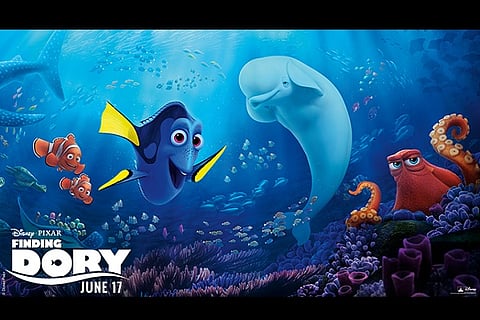

“I cried when Dory found her mother,” says 6-year-old Aadhya, almost as soon as we step out of the theatre. Atharv, also six, pipes in that he did too. Five-year-old Vedanth, the youngest, taunts him and declares, “I didn’t cry at all.”
I’ve just finished seeing “Finding Dory” with four kids under the age of 10: Vedanth, Atharv, Aadhya and eight-year-old Deethya. And the reactions of the foursome don’t sound much like any of the reviews I’ve read in the last couple of days.

For those outside the loop, “Finding Dory” takes off where Pixar’s “Finding Nemo” left off, elevating the loveable, memory-impaired sidekick to protagonist, as Dory searches for the family she lost as a child. Instead of the open oceans, though, this time the blue tang (with clownfish Nemo and Marlin in tow) hops, skips and jumps through aquariums, buckets, fountains and tanks in the Marine Life Institute in California, as she reconstructs fragments of childhood memories.
One of the points where my kiddy companions verge completely away from reviews is on the disability question. On her journey, Dory meets a range of characters, many of whom, like her struggle with disabilities: there is the octopus who is a septopus because he has lost a tentacle somewhere along the way, and the near-sighted whale shark who is always bumping into the walls of her tank and the beluga whale who is sure he is lost his ability for echo-location.
While reviewers expect the film’s lessons on disability to stick quite easily, those terms don’t really work for our foursome. Vedanth only has this to say: “Dory forgot and then she remembered.” Aadhya considers the question a bit more, and says it’s about sticking to it: “Even if you forget, you have to try to remember.” The lesson for them isn’t about inclusion so much as endurance and effort.
Lest one think it’s because they are too young to grasp the concepts in the film, here is their take on villains in the film. Ask them if they are disappointed that there were no scary villains in the film, and they point to a scene where Dory and Hank the octopus must slink their way past thousands of all-too-grabby kids hands. The verdict is unanimous: the humans are the villains. And for evidence, five-year-old Vedanth observes, “All those fish died in Ulsoor Lake (in Bengaluru).”
It seems like a lot of things get framed into dos and don’ts for their own lives. So the big takeaway for the responsible Deethya is, “You should never leave your parents and run away.” Atharv, who does like a bit of a wander, has a more practical lesson in mind as he flips the story of Dory following a trail of seashells to find her parents, “If you are going far away, then you have to leave a trail for your parents to follow.”
With takeaways like that from the film, it isn’t surprising that none of the four want to be Dory, even as they find her a likeable character. There’s some jostling about as each calls the other forgetful, with Aadhya pointing out that Vedanth did actually get lost the last time they had all been out together.
It is Hank the octopus that catches their imagination the most, although they can’t quite agree if he is mean or helpful. What grabs them about Hank, though, isn’t his almost supernatural ability for camouflage, but rather that he manages to ink the whole pond black when one of those grabby human hands gets him. There is a giggly discussion about whether Hank peed the black ink, but clearly the idea of making such a grand mess works far better than his amazing colour-changing abilities that feature so strongly through the film.
As for what stays with them at the end of the day, though, is the entirely land-based climax of a film about sea creatures. “I liked the truck falling with all the fish,” Vedanth says. In this, at least, kids and adults agree that an octopus driving a truck, with directions from a fish in a jar of water on the dash board, isn’t too ridiculous a way to end a film about a talking fish with memory problems.
But despite that final moment of consensus, I could not but feel that we (and here I include myself within the group of adult reviewers, on the other side from the under-10 foursome) had watched very different films, that occasionally had the same lines and visual sequences.